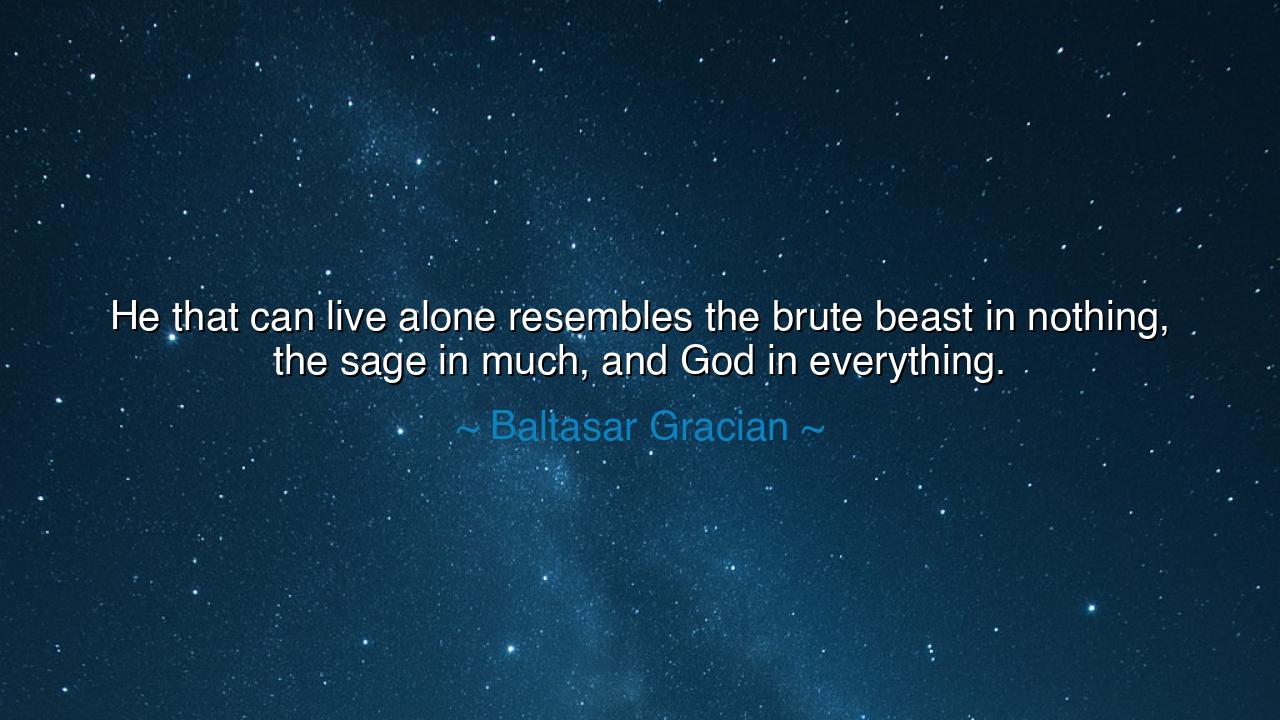
He that can live alone resembles the brute beast in nothing, the
He that can live alone resembles the brute beast in nothing, the sage in much, and God in everything.






"He that can live alone resembles the brute beast in nothing, the sage in much, and God in everything." These words of Baltasar Gracian echo through the corridors of time, urging us to reflect on the profound nature of solitude. At first glance, one might view living alone as a state of desolation, an existence akin to the isolation of the beast. Yet Gracian’s wisdom reveals a truth far deeper. To live alone is not to be abandoned or forsaken, but rather to be elevated to the very essence of self-sufficiency and spiritual freedom. It is not the beast—driven by primal instincts—that one mirrors in solitude, but the sage, and ultimately, the very Divine itself.
Consider, in the ancient world, the example of Diogenes, the Cynic philosopher, who lived a life of radical solitude. He took no possessions and shunned the comforts of society, finding peace in his own self-reliance. Diogenes did not live alone because he feared others; he lived alone because he understood that true freedom came not from the company of many, but from the clarity of mind and spirit that could only be found in solitude. His rejection of societal conventions, his refusal to bow to the expectations of the world, reflected the wisdom of Gracian’s sage—the one who has conquered the world within and does not need the external validation of others to know their own truth. In his solitude, Diogenes found a strength that could not be shaken, a freedom that was untouched by the chaos around him.
The sage that Gracian speaks of is not a recluse who runs from the world, but one who has mastered the art of living within it without being consumed by it. In the life of Socrates, we find a man who spent much of his time in solitude, meditating on the nature of wisdom, yet never withdrew from the world. It was in these quiet moments, alone with his thoughts, that he discovered profound truths about human existence. He embraced solitude not as a retreat but as a means of sharpening his mind, of deepening his understanding. Socrates' solitude allowed him to seek answers from within, to listen to the voice of his inner wisdom, and thus become one of the greatest thinkers the world has ever known. The sage, as Gracian teaches, does not fear solitude but embraces it as a means of becoming more attuned to the voice of wisdom that transcends all external noise.
Then, there is the Divine. When we speak of God, we refer to the ultimate self-sufficiency, to a presence that is beyond all need and beyond all attachment. God is not in need of company, of validation, or of the external world. The Divine is whole, complete, and self-contained. In solitude, God does not seek, does not require, and yet is fully present in the silence of creation. To be like God in solitude is to reach a state of absolute freedom and unity, a oneness with the universe that transcends all separateness. Jesus Christ, in the wilderness, demonstrated this in profound ways. His time alone in the desert, fasting and meditating, was not a time of weakness but of strength, where he found the clarity to begin his mission. The Divine is not bound by the world, and so, the one who can live alone, without fear or need, mirrors the ultimate wholeness of the Creator.
In the modern world, we find ourselves often seeking distractions, filling the silence with the noise of the external world—be it through technology, relationships, or constant activity. Yet, the greatest minds of history—such as Leonardo da Vinci, Isaac Newton, and Marie Curie—knew the value of solitude. It was in these moments of isolation that they were able to break free from the expectations of society and make discoveries that forever changed the course of history. Da Vinci, for example, often retreated into the quiet of his study, where he could fully immerse himself in his ideas, unbothered by the world. He understood that in those moments of solitude, the greatest creations could emerge, untainted by the limitations of the crowd.
The lesson Gracian imparts is clear: solitude is not to be feared. It is a path to greatness, to wisdom, and to the ultimate freedom that comes from within. Those who can live alone are not weak or vulnerable; they are strong, for they have reached a level of self-reliance and inner peace that many never achieve. It is in solitude that we can connect with our deepest truths, shed the illusions that the world imposes upon us, and discover a strength that is both eternal and unshakeable.
Thus, the practical lesson we can take from Gracian’s words is this: learn to embrace moments of solitude in your life. Do not see them as a curse but as an opportunity for reflection, growth, and inner strength. Spend time alone with your thoughts, without distraction, and you will begin to hear the wisdom of your own soul. Seek not the validation of others, but the peace that comes from knowing who you are and what you stand for. In that silence, you will find the clarity to live a life of purpose, unshaken by the noise of the world, and fully aligned with your true self.






AAdministratorAdministrator
Welcome, honored guests. Please leave a comment, we will respond soon